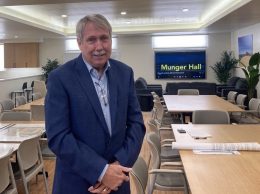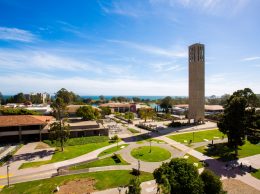Former Energy Secretary calls for manufacturing renaissance
In his first speech since stepping down as U.S. Secretary of Energy in late April, Steven Chu said American needs to actually produce the things it invents or risk losing competitiveness on the global stage.
Speaking at the 2013 Summit on Energy Efficiency in Santa Barbara, he pressed scientists from UC Santa Barbara and elsewhere not to leave their best work in the lab and wait for others to take over commercialization.
“Do not separate materials from manufacturing and design,” he said. He said he was encouraged that “new materials” emerging from U.S. research facilities could “transform the landscape for energy.”
But he said that over the past two decades America has seen many of its best jobs move offshore, leaving an economy that counts on locally-based industries such as restaurants and hospitals to create wealth. “Innovation in America doesn’t stay in America,” he said. “We cannot merely invent things. We need to make them.”
During his talk, Chu said that research efforts were yielding advances in titanium manufacturing, carbon fiber production and steel that could dramatically improve the energy efficiency of commercial aircraft, cars and jet engines and simultaneously lower the cost of production.
He said advances in batteries and power supplies could make plug-in hybrid cars much more accessible to consumers. But he repeatedly stated that unless the U.S. finds ways to be more competitive in manufacturing, it will be at risk of falling behind China and others. He said reduced natural gas prices, thanks to an energy boom in North Dakota and elsewhere, were helping reduce the cost of manufacturing.
Chu was appointed by President Barack Obama as the 12th Secretary of Energy in January 2009, after serving as director of the Lawrence Berkeley National Lab. As Energy Secretary he launched ARPA-E, a program for advanced energy research projects. As a highly trained scientist, he also served as the Obama administration’s troubleshooter-in-chief on the BP oil rig disaster in the Gulf of Mexico in 2010 and Japan’s Fukushima nuclear plant disaster a year later. And he came under intense scrutiny for failed government loans to solar power companies Solyndra and Abound.
Chu was co-winner of the Nobel Prize for Physics in 1997 and has accepted a faculty position at Stanford University.










